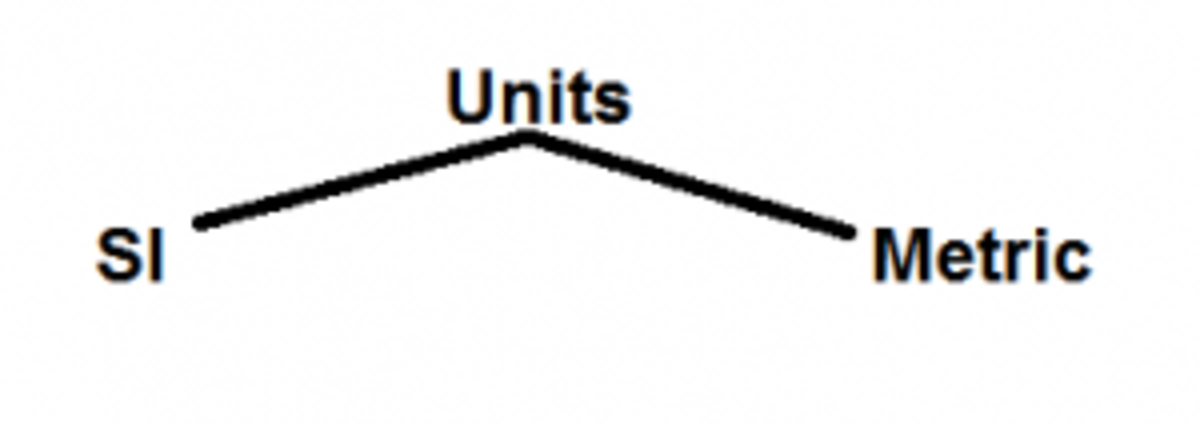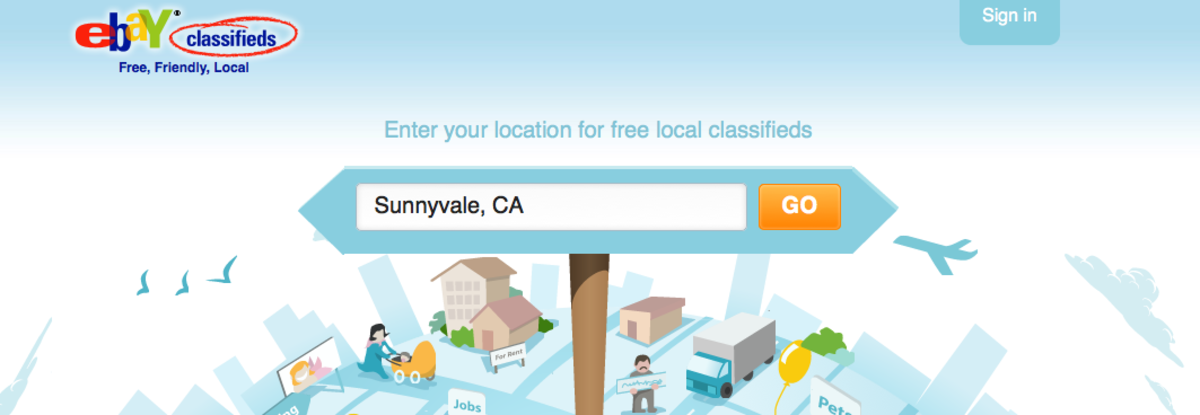Skyrocketing Conversions: 3 Highly-Effective Uses of Facebook Retargeting
There are few more effective ways of leveraging conversions than through retargeting through Facebook. Your marketing efforts on the social media site can transform your website visitors into fully converted users who are happy to sign up, subscribe, download a free eBook or make a purchase among many other potential campaign goals.
The act of retargeting is such an essential one because returning visitors generally show more interest in your products or services, and thus have a much higher inclination towards clicking and converting following their previous visit. The odds of leveraging a conversion can increase even more if they see your ads multiple times.
Of course, it’s worth pointing out that retargeting stands for much more than simply waving your brand in front of old visitors, and there are numerous strategies and uses that your Facebook retargeting campaigns can take in order to encourage greater conversions and familiarity with your business.
With this in mind, let’s take a look at three of the most effective uses of Facebook retargeting that have the potential to skyrocket your company’s conversion rates online:
1. Low hanging fruit
The low hanging fruit approach to retargeting on Facebook is designed to appeal to your audiences’ temptations. Have you ever had the urge to make a purchase, only to talk yourself out of it?
It’s certainly a familiar feeling among many consumers, and it’s this basic human instinct that the low hanging fruit strategy is designed to use to its advantage.
Essentially, when customers visit the various product pages of your website, it indicates that a quantifiable interest and purchase intent is there bubbling under the surface. After all, it’s highly uncommon to have large volumes of visitors land on a specific product page if they’re not interested in purchasing something similar.
By utilising your Facebook Ads account combine dynamic advertisements and custom audiences from a website to dangle your metaphorical fruit in front of your retargeted Facebook users, you’ve successfully managed to appeal directly to those who could be most likely to make a conversion with your company.
What’s more is that this approach could help you to lure customers into your sales funnel before they potentially recommence their search for a similar product on your competitors’ pages.
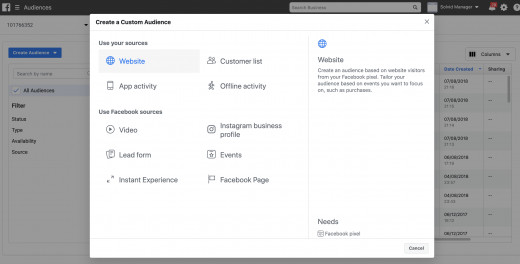
The effectively dangle your metaphorical fruit in your Facebook retargeting campaign, make sure you specifically target users who visit either your website, or, to be more precise, specific pages of your website.
Setting up your audience in this way allows you to potentially show different products to users who have visited different product pages on your site.
It’s also possible to set a timeframe on the recency that your pages were visited by users. Naturally, retargeting users who visited your page three months ago will allow you to market to a much larger audience, but the chances are that they’ll have forgotten about your products by then. As the image above shows, 30 days is a healthy time frame in order to stay relevant.
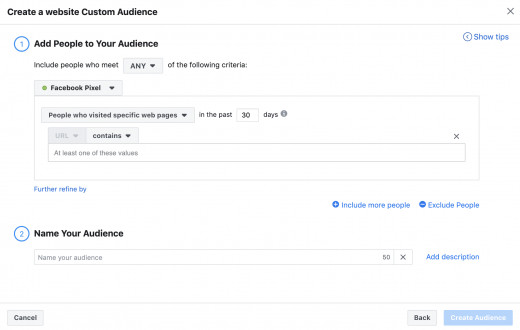
To ensure that you only retarget those who have abandoned your website without making a purchase, be sure to exclude converted users from your campaign. It makes no sense to advertise products or services to users who have already bought them.
Simply specify that users who have visited your conversion confirmation page should be excluded from your campaign. If your website has a www.yourwebsite.com/thank-you-for-your-order page, or a www.yourwebsite.co.uk/order-confirmation URL, these could be good to use in order to keep the converted from seeing your campaign again.
If you're looking for more advanced retargeting options, platforms like Finteza and Google Ads that offer advertisers to retarget ads based on numerous events and visitor statistics.
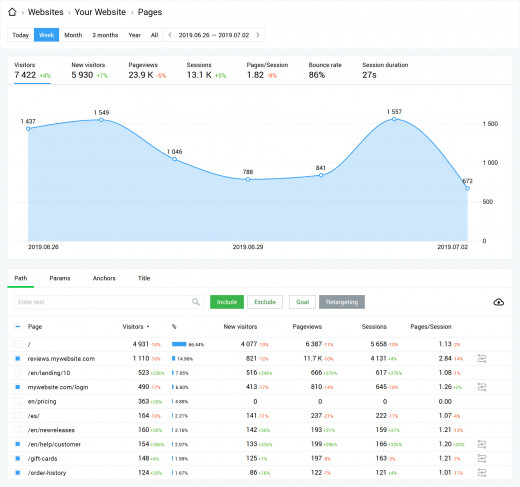
2. Hunting down existing customers
The notion of hunting down existing customers on Facebook seems like something of a pointless endeavour on the surface of things. After all, they’re already aware of your business and have already made a conversion.
However, many existing customers who have made one-off purchases with your business can often forget about your company or become unresponsive to mailing lists for a range of reasons.
Churn is a serious problem that many marketers are eager to limit. Encouraging new visitors to join is one thing, but salvaging unresponsive customers is another matter entirely.
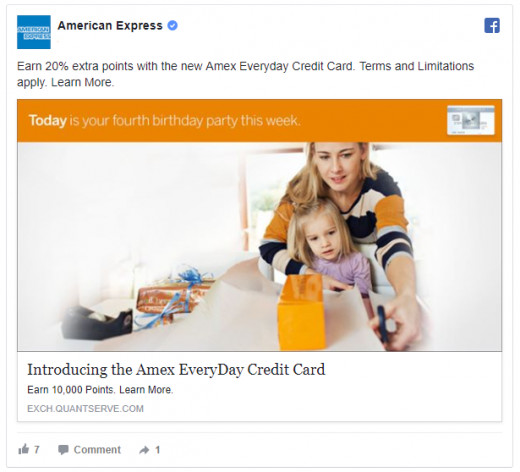
The above image is an example of a retargeting campaign led by American Express in a bid to upsell existing users onto a newer credit card.
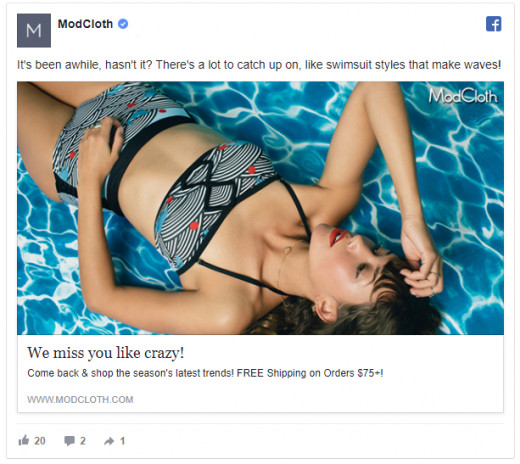
By retargeting unresponsive existing customers, companies have the freedom to add a level of personalisation that can apply to everyone that sees it.
The example above, provided by Neil Patel claims to miss their customer ‘like crazy’. The premise of this form of ad is to just give old existing customers a little nudge to remind them that you’re still there.
This approach to retargeting is a highly effective one but not all businesses believe it holds enough value to undertake. Fundamentally, there’s no harm in asking existing customers to give you another chance. They’re already aware of your business and familiar with your products - so a little push could be highly effective.
To set up existing customer retargeting, head into Facebook’s Business Manager’s Audiences menu.
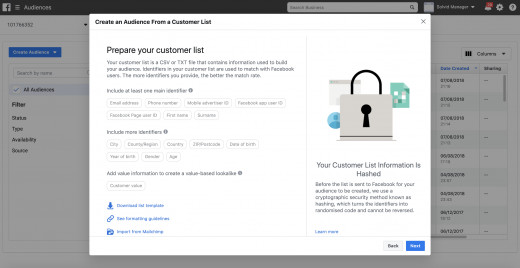
To effectively retarget your customers, it’s advisable to make a customer file or MailChimp contact list that’s based on how old or unresponsive your customers are.
Naturally, if you have old customers who are regularly making purchases on your website, create a list that excludes them rather than risk wasting your money getting in touch with them.
Sometimes customers need a small nudge to remind you they’re there. Existing customer retargeting does just that.
3. Keep irrelevance away
Fundamentally, retargeting does so much more for your marketing efforts than simply displaying the same ad to Facebook users who you expect to have an interest in your products or services.
But one of the lesser appreciated strategies of Facebook retargeting comes in the form of excluding irrelevant users as well as segmenting those that are deemed relevant.
As we’ve touched on before, customers who have recently accessed your website and made a purchase should be regarded as irrelevant for your campaigns, but other users who reach your website without displaying enough of an interest should also be actively excluded.
You may want to exclude users who have visited the pages that are displayed when a conversion has been completed. But what about visitors who have visited your career page? Or customer service pages? Including them within your Facebook campaign could be a sure-fire way of losing money.
You may also want to consider excluding users who spend less time on your pages. Users who bounce back off of your website are considerably less likely to be interested in making a conversion on your site.
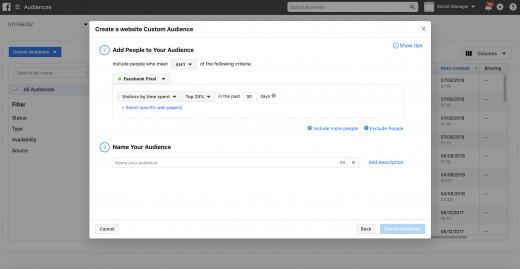
The example above shows that you can not only set up custom audiences but also categorise them by how long they’re set to spend on your website in order to reach only the most relevant users.
When setting your Facebook retargeting campaign in order to reach the audiences that matter to you, it’s worth taking the time to research your visitors accordingly. There are plenty of free tools that provide invaluable insights into the types of visitors you’re attracting, specifically Google Analytics is a great resource.

